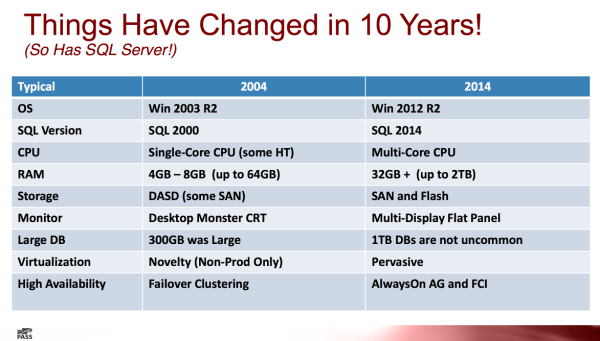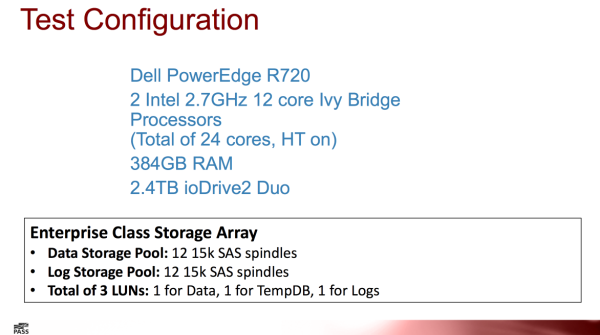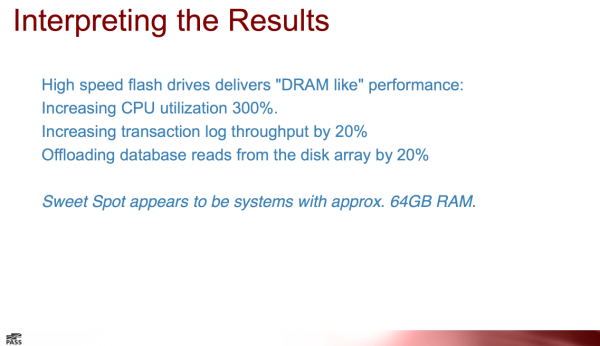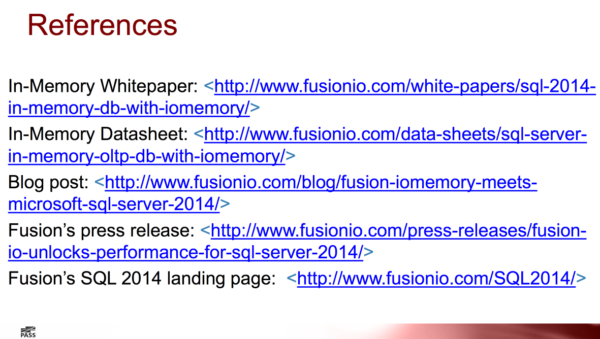I woke up this morning, excited for the 24 Hours of PASS, and the slide decks are already online! Let’s check out the slides for the first session, Field Testing Buffer Pool Extension and In-Memory OLTP Features in SQL Server 2014.
They start out by talking about how the SQL Server world has changed:

Things definitely have changed – 4-8GB used to be normal for SQL Server, and now 32GB is pretty much the bare minimum for physical servers as the slide notes. I see smaller VMs a lot still though.
Then they start talking about the first new feature, Buffer Pool Extensions. Here’s the hardware they used for testing:

Awesome! 24 cores means we’re talking about the Big Daddy of SQL Server – Enterprise Edition. The sticker price on this solution is around $168k USD, so it’s great to see they used the appropriate amount of memory here, 384GB of RAM. No playing around with this system.
So how’s the test set up?

And by soul I mean RAM?
What the – what happened to our 384GB of RAM? Why did we get SQL Server drunk and tie its hands behind its back? Someone, please, help, there’s a SQL Server being abused here!
And why are we testing with 2004 hardware? Didn’t they just get done telling us how hardware has changed? What the heck is going on here?
The “test” results are useful only in the sense that they’re good for a laugh:

So transactional throughput goes up by 37%, but CPU … TRIPLES?!? How about we let this SQL Server use all of its memory and see how the test fares? Why wouldn’t this scenario be tested?
This is where I have to keep asking – is this an educational presentation, or a marketing presentation?
I don’t have the time before this session to really analyze the deck, although I’ve written about the wild inaccuracies of Fusion-io’s SQL 2014 tests before. Let’s just look at the takeaways from the first feature tests:

The “sweet spot” is less memory than SQL Server 2014 Standard Edition supports? Putting a Fusion-io drive in rather than buying memory? What, are Fusion-io drives free now? In what world does this make any economical sense at all?
So what references did they draw from for this “educational” session?

Oh, right.
Everyone involved in this session should be ashamed. This isn’t community education. It’s Fusion-io marketing, pure and simple.
I am deeply disappointed that PASS would allow this to masquerade as educational material.
Update After the Presentation
The presentation was just what it looked like – a Fusion-io marketing pitch, not educational material for SQL Server community members facing real pain points. Huge, major props to Bradley Ball, the session moderator, who asked the attendee questions and held the presenters to the fire.
During the Q&A, we learned that the testing didn’t actually unearth any real use cases for Buffer Pool Extensions. The presenters admitted that whenever you can add memory to a server, that’s a better answer than buying expensive solid state storage. Their testing also showed limited performance gains over 16GB of memory – thereby meaning that it’s always better to add memory.
The presenters kept suggesting that this technique would work for virtual machines, though, demonstrating a fundamental misunderstanding of virtualization. Don’t ever use local SSDs in the host for SQL Server’s Buffer Pool Extensions – this stops you from using vMotion or LiveMigration to recover automatically from host failure. This is just simply the wrong answer, period.
The good news is that Bradley pushed past the vendor spam and got to the truth.
The bad news is that this session was shown to PASS members who didn’t have the benefit of knowing that it was pure marketing spam, plain and simple. This is why I’ve been beating this drum so hard leading up to PASS.
If PASS is going to show spam and call it training, it’s up to us – community volunteers – to get the truth out.


10 Comments. Leave new
this is what happens when you have to put numbers (read: money) to justify your existence as a PASS president, member of the board, etc.
Thanks Brent! The problem of course is that unless you really know what you are doing with hardware and hardware numbers you aren’t likely to catch things like this. Even many of us who have been using SQL for quite a while are going to miss this because we don’t have the hardware expertise that you do.
So thanks again for being a voice of reason and reality.
Kenneth – you’re welcome, sir. Call me crazy, but I really don’t think I’ve got any special knowledge – I think it’s more just about having the time to dig into this kind of thing.
And maybe caring a little too much. (sigh) I woke up at 4AM on my vacation just so I could watch the 24 Hours of PASS, hahaha.
It’s not so much “special” knowledge. Not to take anything away from your awesome knowledge of all things SQL. It’s that your knowledge is different than mine. I consider myself quite good at certain parts of SQL Server, just not this one. For stuff like this I rely on you and a few others to point me in the right direction.
This is so weird. How could anyone who understands SQL Server and hardware think this is a good test rig?
Brent,
Great post.
As fantastic as Fusion-IO products are, it’s obscene to see their marketing and sales folks trying to treat SQL Server customers like idiots with wallets.
Only, if we’re honest, Microsoft kind of set that precedent – by squeezing folks to move up to Enterprise Edition thanks to artificially restricting Standard Edition to 64/128GB of RAM, and by constantly trying to push SQL Server users over to Azure (where Microsoft’s margins are so much better and recur monthly). e.g., pieces like this are part of the same obscenity you’re combating here:
http://blogs.technet.com/b/dataplatforminsider/archive/2014/06/18/why-sql-server-runs-best-on-microsoft-azure.aspx
And here’s the thing, Azure isn’t bad – nor is Fusion-IO. But talking to people who live and work in the trenches like they’re idiots? That doesn’t do anyone or anything any favors.
–Mike
Ladies, Gents, & Geeks, your reasonable concerns notwithstanding, I can assure you that many of us take our Community obligations seriously. Indeed, in my Columnstore presentation, I frankly mock the marketeers (sh-h-h–please don’t snitch on me). We are passionate about the technology & are candid about its deficiencies, yet when appropriate–for example when it comes to game-changers such as Columnstore–the enthusiasm is genuine & appropriate.
[…] Fact-Checking The 24 Hours of PASS – Brent Ozar (Blog|Twitter) […]
[…] their own session? Don’t recoil in horror – most SQLSaturdays work this way, and this past 24 Hours of PASS appears to have went the same way, although PASS still hasn’t publicly admitted money was involved […]
[…] Brent Ozar – Fast-Checking the 24 Hours of Pass […]